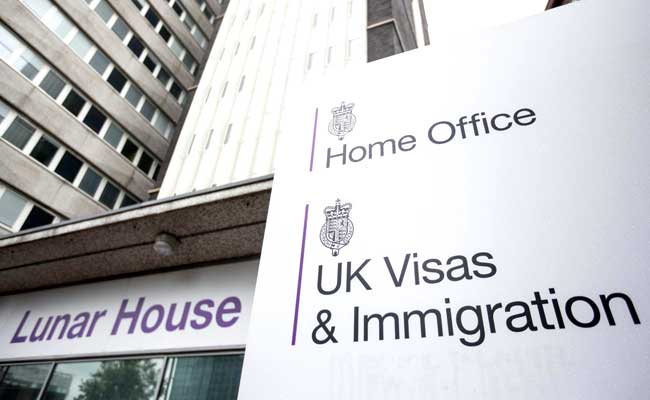Deportations: In the year ending March 2021, enforced returns from the UK decreased to 2,420, less than half the number (64% fewer) in the previous year, and the lowest number since the series began in 2004. Although the number of enforced returns has been declining since the peak in 2012, the sharp fall in the latest year was related to the impact of the COVID-19 pandemic. There were just 361 enforced returns in 2020 Q2 (April to June), immediately following the outbreak. Although numbers did increase in Q3 (837) and Q4 (800), they decreased to 422 in 2021 Q1, coinciding with the lockdown imposed in early January 2021. In the year ending March 2021, 2,345 FNOs were returned from the UK, 51% fewer than the previous year (4,784). FNO returns had fallen to 5,124 in 2019, following a steady increase between 2011 and 2016 due to more FNOs from the EU being returned. FNO figures are a subset of the total returns figures and constitute 41% of enforced and voluntary returns, with the majority being enforced returns.
Immigration Detention: The number of people entering detention in year ending June 2021 was 17,088, 11% fewer than the previous year. Although in part affected by the COVID-19 pandemic, this continues a general downward trend since 2015 when the number entering detention peaked at over 32,000. As at 30 June 2021, there were 1,550 people in immigration detention, 122% more than at 30 June 2020 (698) immediately following the first UK lockdown, but 5% fewer than at 31 December 2019 (1,637), pre-pandemic. In the year ending June 2021, 16,209 people left the detention estate (down 19%). Over two-thirds (69%) had been detained for seven days or fewer, compared with 40% in the preceding year. This is in part due to an increasing proportion of detainees being those detained for short periods on arrival to the UK before being bailed, typically while their asylum (or other) application is considered.
Grants of Asylum or Protection: The UK offered protection, in the form of asylum, humanitarian protection, alternative forms of leave and resettlement, to 10,725 people (including dependants) in the year ending June 2021, 37% down from the number in the year ending June 2020. This included 661 people granted protection through resettlement schemes, 81% fewer than in the previous year. The fall in the number of people offered protection is due to fewer initial decisions being made on asylum applications (13,929 decisions compared with 18,239 in the previous year), as well as the pause to resettlement activity between March and November 2020, both impacted by the COVID-19 pandemic. There were 31,115 asylum applications (main applicants only) in the UK in the year ending June 2021, 4% fewer than the previous year. This latest figure will have been impacted, in part, due to the measures taken in response to COVID-19. In the year ending June 2021, there were 13,929 initial decisions made on asylum applications. Over half (55%) of these were grants of asylum, humanitarian protection or alternative forms of leave (such as discretionary leave or UASC leave), up from the previous year (53%).
Citizenship: There were 200,177 applications for British citizenship in the year ending June 2021, 35% more than in the year ending June 2020. Applications for citizenship by EU nationals rose by 83% compared to the previous year, to 74,384. EU nationals now account for more than a third (37%) of all citizenship applications compared with 12% in 2016. Increases in citizenship applications from EU nationals since 2016 are likely to reflect more people seeking to confirm their status in the UK following the EU referendum and the UK’s exit from the EU. There were 147,369 grants of British citizenship in the year ending June 2021, 4% more than the previous year. This was due in part to the COVID-19 pandemic response and comes after a period of relative stability since 2014.
Settlement: There were 108,773 decisions on applications for settlement in the UK in the year ending June 2021, a 26% increase on the previous year. Of these, 106,876 (98%) resulted in a grant.
Extension of Temporary Stay in the UK: Excluding extensions granted to individuals who were unable to leave the UK because of travel restrictions or self-isolation related to COVID-19, there were 327,211 decisions on applications to extend a person’s stay in the UK (including dependants) in the year ending June 2021, 27% more than a year earlier.
Permits Granted for Family Reasons: There were 215,746 visas and permits granted for family reasons in the year ending June 2021, 40% more than the year ending June 2020. A sharp fall in grants was seen in April to June 2020 due to the impacts of the COVID-19 pandemic. However, the number of grants of visas and permits has begun to recover to pre-pandemic levels. There were 97,189 grants of visas to dependants of people coming to the UK on other types of visas, up 46%; there were particularly large increases in grants to dependants of Sponsored study visa holders (up 13,423 to 29,967), and dependants of Skilled workers (up 13,479 to 50, 671). There were 51,814 EUSS family permits issued to non-EEA close family members of those granted settled or pre-settled status through the EU Settlement Scheme (up 307%). This is likely to be linked to publicisation of the EU Settlement Scheme deadline of 30 June 2021 for EEA citizens and their family members resident in the UK before the end of the transition period at 11pm on 31 December 2020.
Source: Home Office, https://is.gd/k546ua
